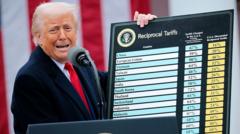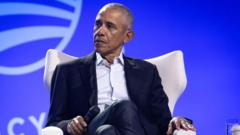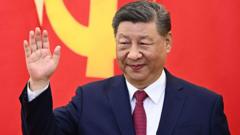In a perplexing series of announcements, Donald Trump has indicated that Chinese electronics, including smartphones, will face new tariffs, despite earlier exemptions, stirring uncertainty across markets.
Trump's New Tariff Threats Resurface Amid Confusion Over Smartphone Exemptions

Trump's New Tariff Threats Resurface Amid Confusion Over Smartphone Exemptions
Trump's mixed signals on tariffs leave electronics sector in turmoil as market reacts to potential new levies.
In a recent wave of tariff-related controversy, former President Donald Trump asserted that smartphones and other electronics from China would not remain exempt from tariffs, contradicting prior communications from his administration. On Friday, market optimism briefly surged following a notice indicating that specific products would avoid additional levies of up to 145%. However, Trump's latest statements suggest they are merely shifting into a different "tariff bucket", intensifying the ongoing trade conflict.
China has promptly responded to Trump's assertions, urging him to "cancel" his tariff regime and advocate for mutual respect in trade relations. U.S. officials clarified that these electronics would now be subject to a "semiconductor tariff," details of which are anticipated in an upcoming announcement by Trump.
US Commerce Secretary Howard Lutnick emphasized the need for domestic production of vital components such as semiconductors, essential for electronics ranging from smartphones to laptops. As a result of the shifting tariff landscape, Sony has announced a 10% price increase for its PlayStation 5 in Europe and other markets, citing economic challenges, although U.S. consumers are currently unaffected.
China's commerce ministry labeled Trump’s initial exemptions a mere "small step", indicating that they were assessing the implications of these developments. The continued threat of new tariffs complicates expectations for improvement in U.S.-China trade relations, as Trump’s administration outlines plans for future levies.
When asked about the potential for dialogue between Trump and Chinese President Xi Jinping, U.S. Trade Representative Jamieson Greer stated there were no current plans for discussions. As tensions escalate, Trump’s administration enforces a progressively tightening tariff regime, first implementing tariffs of 54%, and then increasing them to 145% on imports from China as of April.
Each country has retaliated with escalating tariffs, further complicating the dynamic. While the White House maintains that these measures serve as negotiating tactics to foster more favorable international trade conditions, the impact on global markets has triggered stock market fluctuations and raised concerns regarding the potential for decreased international trade, which might affect jobs and economies worldwide.
Trump's evolving stance on tariffs raises further questions about the future of U.S.-China trade negotiations and the implications for the global marketplace, leaving consumers, businesses, and investors bracing for the consequences.






















